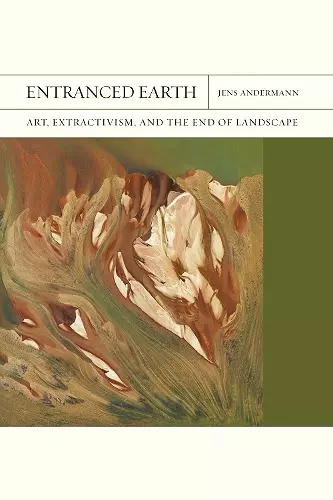Entranced Earth Volume 45
Art, Extractivism, and the End of Landscape
Format:Paperback
Publisher:Northwestern University Press
Published:31st May '23
Currently unavailable, and unfortunately no date known when it will be back

A sweeping analysis of the lasting effects of neocolonial extractivism in Latin American aesthetic modernity from 1920 to the present
Looking to the extractive frontier as a focal point of Latin American art, literature, music, and film, Jens Andermann asks what emerges at the other end of landscape. Art in the Global South has long represented and interrogated “insurgent nature”—organic and inorganic matter, human and nonhuman life, thrown into turmoil.
In Entranced Earth: Art, Extractivism, and the End of Landscape, Andermann traces the impact of despaisamiento—world-destroying un-landscaping—throughout the Latin American modernist archive. At the same time, he explores innovative, resilient modes of allyship forged between diverse actors through their shared experiences of destruction. From the literary regionalism of the 1930s to contemporary bio art, from modernist garden architecture to representations of migration and displacement in sound art and film, Entranced Earth tracks the crisis of landscape and environmental exhaustion beyond despair toward speculative, experimental forms of survival.
“Iberian colonial expansion was central to the creation of a modern regime of extractivism and its aesthetics, including landscape. Entranced Earth marshals exhaustive research into this legacy to undertake dazzling analyses from a capacious archive of Latin American art and literature: from modernist and regionalist works of the early twentieth century, to prescient environmental art of the 1960s, to contemporary interventions. Entranced Earth compellingly explores the ways that modern and contemporary Latin American aesthetics have been singularly and precociously marked by colonial extraction, but have also forever worked against it, “unlandscaping” and embracing trance--a merging of agent and object--to forge arts of survival amidst planetary crisis. Entranced Earth makes a major contribution to a growing body of work on Latin American aesthetics and the environment.” - Rachel Price, author of The Object of the Atlantic: Concrete Aesthetics in Cuba, Brazil, and Spain, 1868–1968
“Working from the crisis of our neo-extractive present, Jens Andermann traces an alternative history of Latin American cultural production in the twentieth and twenty-first centuries, a ‘post-landscape tradition’ that foregrounds complex and often precarious human/nonhuman assemblages. Entranced Earth is a sophisticated, erudite, and theoretically resourceful intervention in the fields of literature, film, art, and landscape criticism. It’s also an engrossing narrative, full of perceptive analyses, surprising juxtapositions, and archival riches.” - Jennifer French, author of Nature, Neo-Colonialism, and the Spanish American Regional Writers
“Entranced Earth represents one of the most ambitious and theoretically sophisticated efforts to bring a broad swath of the Latin American cultural archive to bear on emerging discussions around climate crisis and the Anthropocene. It stands out, too, for its mastery over an astonishing variety of aesthetic forms including not only literature and film but also visual art, eco- and bio-art, architecture, gardening, and sonic production.” - Adriana Johnson, author of Sentencing Canudos: Everydayness and Subalternity in the Backlands of Brazil
“At the end of the landscape and in the wake of the forces of extractive un-landscaping, Jens Andermann articulates a mode of living in that which others bemoan only as loss. Entranced Earth offers aesthetics as a way of thinking and enacting an ethics and a politics in the inmundo--the unworlding already here. Guiding us deep into not just the violence of extraction but also the modes of survival palpable in the thick, heavy, weighted, and densely implicated and contaminated enmeshment of life in the unworld, Andermann shows us how not to rush for the fantasy of exit. This is the magisterial classic the environmental humanities as re-envisioned from the perspective of the Global South deserves.” - Jill H. Casid, author of Sowing Empire: Landscape and Colonization
ISBN: 9780810145924
Dimensions: unknown
Weight: unknown
336 pages